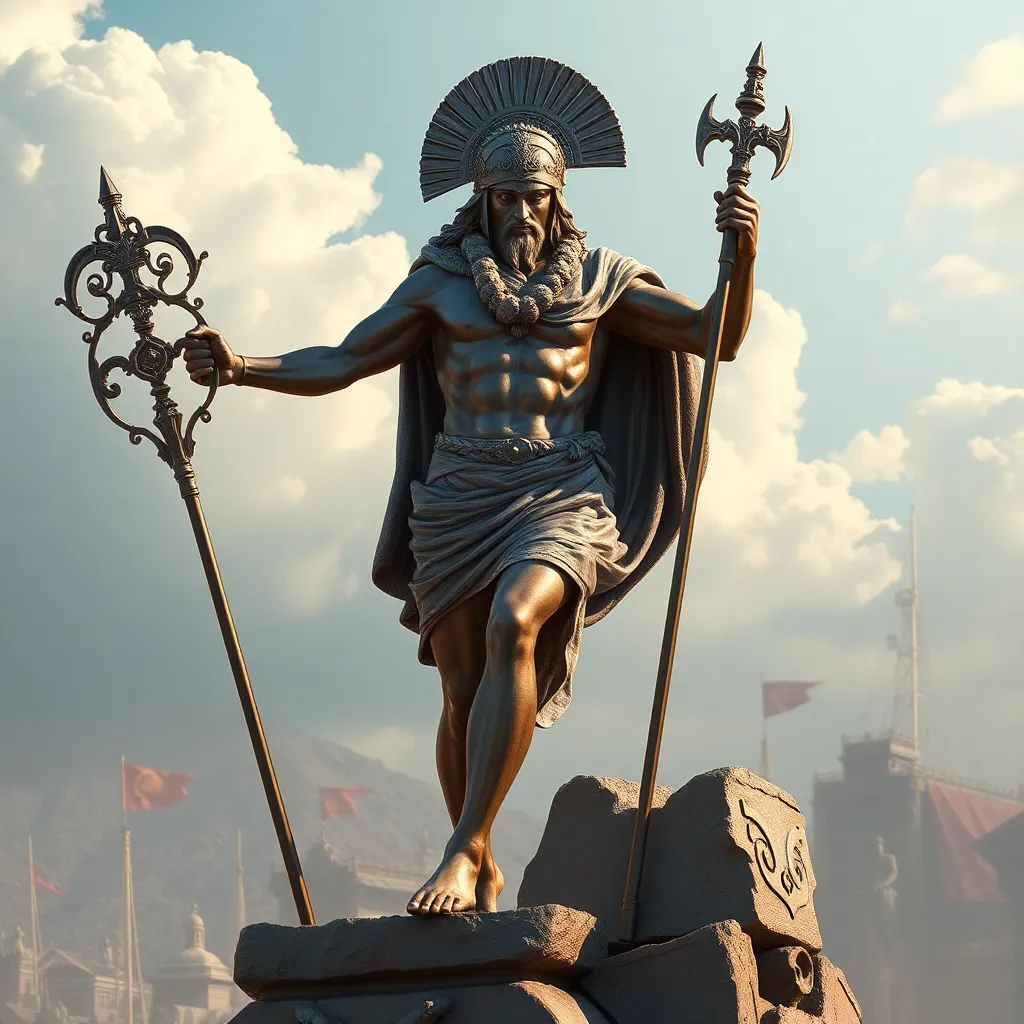The Role of Hermes in the Trojan War: Myths and Legends
I. Introduction
The Trojan War stands as one of the most significant events in Greek mythology, a tale of love, betrayal, and heroism that has inspired countless works of art and literature. At the heart of this epic conflict are numerous gods and goddesses, each playing their part in the fate of mortals. Among these deities, Hermes, the messenger god, holds a unique and multifaceted role.
This article aims to explore Hermes’ contributions and significance in the Trojan War, shedding light on how this cunning deity influenced the course of events through his actions, attributes, and relationships with both gods and mortals.
II. Hermes: The Messenger God
Hermes is often depicted as a youthful figure with winged sandals, a staff known as the caduceus, and a distinctive hat. He embodies attributes of speed, cunning, and eloquence, which make him an essential communicator among the gods and humans.
In the context of war, effective communication is vital. The ability to relay messages can change the tide of battle, and Hermes excels in this role:
- He serves as a divine intermediary between gods and mortals.
- His swift movements allow him to deliver critical information rapidly.
- Hermes is known for his persuasive speech, aiding in negotiations and diplomacy.
As a messenger god, Hermes plays a crucial role in conveying the intentions of the gods to the mortals engaged in the Trojan War.
III. Hermes as a Guide for Souls
In ancient mythology, Hermes is known as a psychopomp, a guide for souls transitioning to the afterlife. This role is particularly poignant in the context of the Trojan War, where many heroes meet their demise.
After battle, Hermes is responsible for guiding fallen warriors to the underworld, ensuring they reach their final resting place. This duty is significant for several reasons:
- It highlights the inevitability of death in war.
- It showcases Hermes’ compassion for the fallen, offering them dignity in death.
- His presence in this role underscores the connection between life and death, a recurring theme in the Trojan War narratives.
Through his guidance, Hermes not only helps the souls of fallen warriors but also reinforces the idea that even in death, there is a divine order and respect for the hero’s journey.
IV. Involvement in Key Events of the Trojan War
Hermes’ involvement in the Trojan War is marked by his assistance to key characters such as Achilles and Odysseus. His interventions often have a significant impact on the war’s progression.
Some notable myths involving Hermes during the conflict include:
- Hermes providing Odysseus with the vital information needed to outsmart the Cyclops.
- His guidance in the use of the famous Trojan Horse, which ultimately led to the fall of Troy.
- Assisting Achilles in navigating the challenges of battle and offering counsel during critical moments.
Through these actions, Hermes not only influences individual characters but also plays a pivotal role in shaping the overall narrative of the Trojan War.
V. Hermes and the Divine Council
Hermes’ interactions with other Olympian gods during the war reveal the complexities of divine relationships and their implications for mortals. In the divine council, Hermes often acts as a mediator between conflicting gods.
His role involves:
- Negotiating peace and strategy among the gods.
- Influencing the decisions of deities like Zeus, Hera, and Athena.
- Balancing the desires of gods with the fate of mortals, often advocating for the heroes he favored.
These divine strategies and conflicts illustrate how Hermes’ decisions directly affect the mortal realm, showcasing the interplay between divine will and human fate.
VI. Symbolism of Hermes in the Trojan War
Hermes embodies various symbols that resonate throughout the Trojan War. His representation of transitions and boundaries is particularly significant:
- As a messenger, he symbolizes the movement between different realms: divine and mortal, life and death.
- His cunning nature reflects the necessity of cleverness and diplomacy in warfare.
- Hermes represents the duality of war and peace, emphasizing that conflict can lead to both destruction and resolution.
Through these symbols, Hermes becomes a powerful figure that captures the complexities of human experience in times of war.
VII. Legacy of Hermes in Post-Trojan War Narratives
The actions of Hermes during the Trojan War have left an indelible mark on subsequent myths and stories. His character continues to evolve in later literature and art, reflecting various aspects of his persona:
- In later myths, Hermes is often portrayed as a trickster, highlighting his cleverness and resourcefulness.
- Artistic representations of Hermes emphasize his role as a guide and messenger.
- His story contributes to the cultural memory of the Trojan War, serving as a reminder of the complexities of divine and mortal interactions.
The legacy of Hermes enriches the tapestry of Greek mythology, illustrating how the consequences of the Trojan War reverberate through later narratives.
VIII. Conclusion
In summary, Hermes plays a multifaceted and significant role in the narrative of the Trojan War. His contributions as a messenger, guide for souls, and mediator among the gods underscore his importance in this epic tale. Hermes not only influences the outcomes of key events but also embodies the complexities of communication, cunning, and the duality of existence.
Reflecting on Hermes’ lasting significance in mythology, it becomes clear that his presence in the Trojan War serves as a powerful reminder of the interplay between divine influence and human fate. As a symbol of transition and cleverness, Hermes continues to resonate within the broader context of Greek mythology, ensuring that his legacy endures for generations to come.




